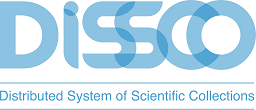Please use this identifier to cite or link to this item:
http://dx.doi.org/10.34960/42| Title: | D9.2 Humanities Researcher Synergies with Natural Science Collections and Archives |
| Authors: | Loo, Tina Casino, Ana Gödderz, Karsten Wijers, Agnes |
| Keywords: | Policy harmonisation & International coordination;DiSSCo;natural heritage;cultural heritage;digital collections |
| Publication Date: | 2020 |
| Publisher: | ICEDIG |
| Citation: | Loo, Tina, Casino, Ana, Gödderz, Karsten, & Wijers, Agnes. (2020). Humanities Researcher Synergies with Natural Science Collections and Archives. http://doi.org/10.5281/zenodo.3685634 |
| Abstract: | Task 9.4, Link with Cultural Heritage, falls under WP9, Communication and Dissemination, an effort to identify external actors and ensure their input through effective communication, liaison, networking and dissemination. The task states that a multidisciplinary understanding is needed to effectively plan for the development of a global research infrastructure, thereby requiring that external actors and their potential synergies be identified. It further specifies that the inherent overlap of biodiversity collections with cultural heritage collections, especially in terms of accession books and field notebooks, must be made more explicit, and a roundtable of cultural heritage professionals is identified as a means to discuss these synergies. The scope of this task is limited to identifying synergies that humanities researchers derive from natural science collections, data and archives. Fulfilling this objective was approached in two ways: (1) surveying humanities researchers working at the interface of natural science collections and humanities regarding their use of natural science collections, data and archives, and (2) discussing survey results with other (digital) humanities professionals, and representatives of national and pan-European humanities platforms and research infrastructures in a roundtable format. Survey results and use cases demonstrated a need by this group of humanities researchers for using a natural science collections data and archive resource and preferably an integrated one, however, the survey was not statistically significant and did not represent the entire demographic. Discussions at the roundtable covered many subjects. Most notably: * Planning, organizational and policy concerns were expressed with respect to quantifying the demand for the data resource and having a means to assess whether it warrants investment, roles and responsibilities for driving the initiative and facilitating access and services, and the need to have a clearer understanding of the logistics of this specific landscape. * A suggestion was made to make a feasible small start by finding common ground through early collaborations on open data standards ensuring future interoperability. Final outcomes: * It is the consensus of the roundtable that there is sufficient synergy between the domains to warrant further exploration but the framework and individual responsible to drive the effort forward remains undefined. Suggestions for a collaborative framework include FAIR, EOSC and Horizon Europe. If there is targeted funding, performing a large, comprehensive, statistically significant survey encompassing all synergies from both domains can serve as a basis for addressing planning, organizational and policy concerns. Otherwise collaborating on open data standards is a good start. * Strategy must be discussed at higher management levels. * A key, post-roundtable appointment of a digital humanities specialist and national DARIAH representative to DiSSCo's Science Advisory Board was made. The appointee will be in a strategic position to provide humanities input as well as monitor potential collaborative opportunities. |
| URI: | https://know.dissco.eu/handle/item/108 |
| DOI: | https://doi.org/10.5281/zenodo.3685634 |
| Appears in the Folders: | ICEDIG Work Package 9 - Project Management |
Files in This Item:
| File | Description | Size | Format | |
|---|---|---|---|---|
| d9.2_cultural_heritage_synergies.pdf | 8.76 MB | Adobe PDF | View/Open |
This item is licensed under a Creative Commons License
